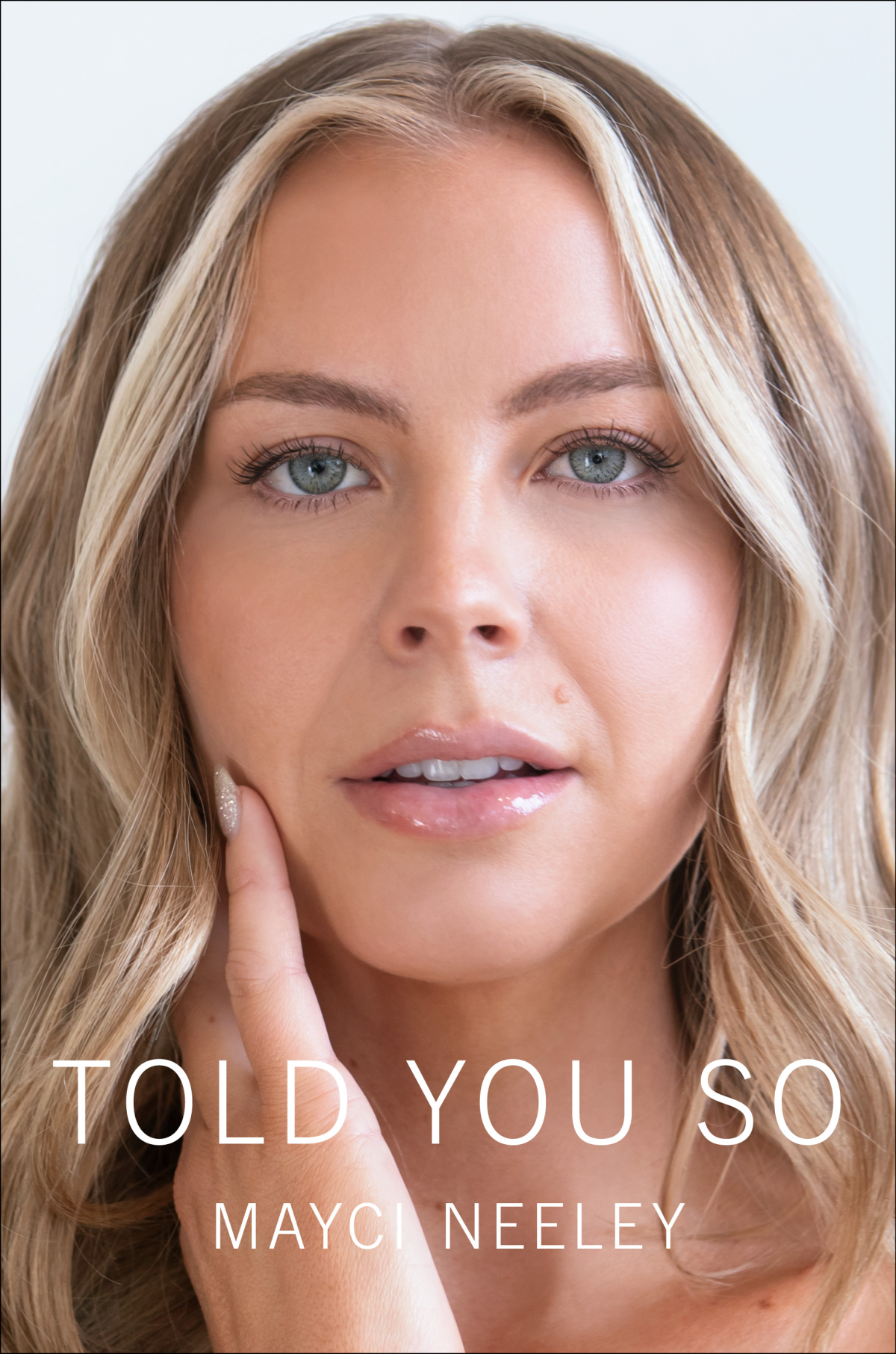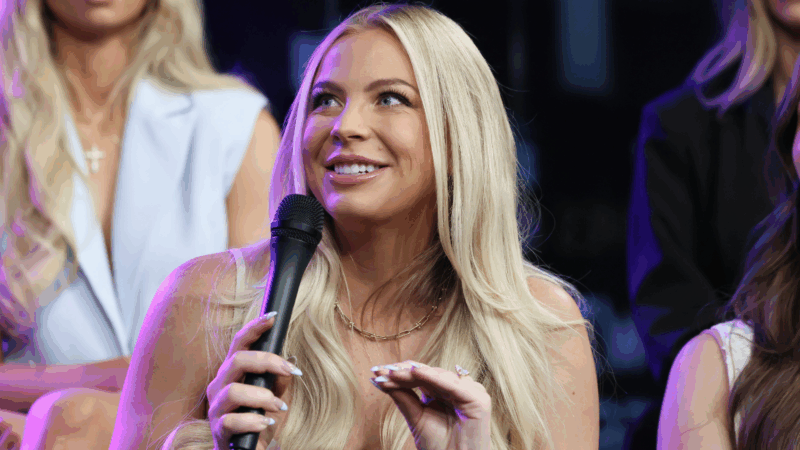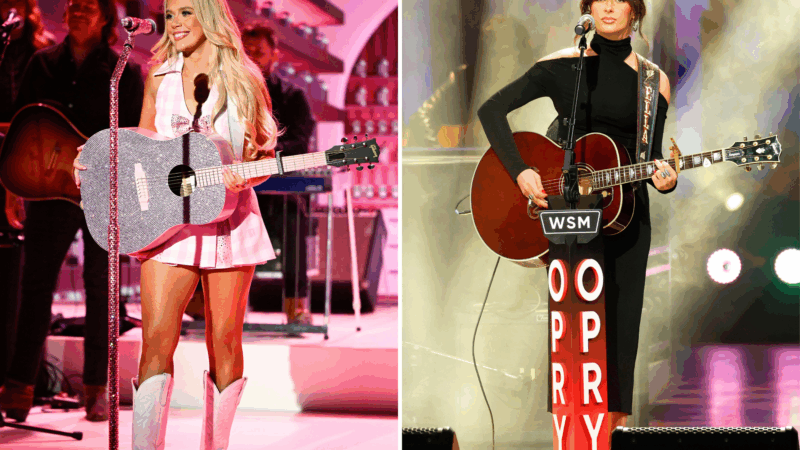‘Mormon Wives’ star Mayci Neeley shares her complex life in new memoir
In the reality show, The Secret Lives of Mormon Wives Macyi Neeley presents herself as one of the more grounded members of #MomTok — a group of social media influencers documenting their daily lives.
But in her new memoir, Told You So, she throws the doors to her past wide open.
Using details she wrote in her journal, Neeley documents her sexual assault, unplanned pregnancy and the sudden death of her college boyfriend all while navigating being a member of The Church of Jesus Christ of Latter-day Saints.
“As I’ve gotten older knowing that I can have a great relationship with God and Jesus,” she told NPR. “I don’t have to be this perfect example of a Mormon.”
The book opens with a gripping moment in Neeley’s life — the day she found out her boyfriend had died while she was pregnant with their child.
“I started there to kind of give people a summary of what’s to happen. If anything, for me, it’s almost like a trigger warning for people to know, like this is going to be rough,” Neeley told All Things Considered host Juana Summers.
But Neeley also hopes her story connects with others. “It’s going to be able to relate to so many different people who have gone through something similar.”
The following conversation has been edited for length and clarity.
Interview highlights
Juana Summers: You grew up in The Church of Jesus Christ of Latter-day Saints and attended church with your family, abided by the social rules of your religion.
But you also write that you’ve always been a person who’s intrigued with things that were off limits, that you weren’t told the reasoning behind many of the rules of your faith. So, I wonder, how do you think about that now?
Mayci Neeley: I feel like I’ve always been a really curious person and I do feel like I got most of that curiosity out during my college years.
I take what I want to take and then I leave some other stuff that doesn’t really feel like it applies to me in my life. I think just going through everything did help with that because I realized that alcohol and other things didn’t mesh well with me.
I also didn’t really know what I was doing because I wasn’t educated a lot on it growing up. And so I feel like I was an all-in kind of girl, that kind of scares me. I think I’ve experienced it enough, and now I’m like, I’m good.
Summers: You’re also now a mom, so I wonder, how are you raising your children to think about the big stuff like sex and drugs and faith in the church?

Neeley: I have this conversation with my husband a lot. Where I think you learn from your own experiences and how your parents raised you, which I think my parents were great, but there’s certain aspects where I’m like, OK, with my kids, I’m actually going to do this. And I feel like one of those things is having a better education on sex, obviously as number one, because I got pregnant so young.
Summers: Several times throughout your book, you write about meeting with a bishop, the process of repenting, which is something that is normal in your faith. In some of these encounters, when you describe them, you leave and you feel better, but in others you feel cut down.
There’s one meeting that you talk about where you’re trying to speak out about the sexual assault that you experienced, and you say that you were made to feel like the perpetrator rather than someone who was harmed. And I just have to say, reading that, it sounded really challenging.
Neeley: It was very difficult. I remember just after that meeting with my bishop, I went to my dad’s car and I just started sobbing because I felt so dismissed in that moment. Then deep down, I feel like it made me hold all this stuff inside.
And I was like, it’s my fault for all these things that happened. That stuck with me for years until I finally went to therapy for the first time.
I know so many people in the church have experiences like I do, where they have a bishop who doesn’t believe them or a bishop who makes them feel horrible. That’s what happened to me. They’re also great bishops in the church, you don’t really know what you’re going to get.
Summers: In the book you referenced the statement from The Church of Jesus Christ of Latter-day Saints, which made headlines. Now, it doesn’t explicitly mention the show, but it says:
“A number of recent productions depict lifestyles and practices blatantly inconsistent with the teachings of the church.”
And when you wrote about this in the book, you say that you’re over living your life, focused on what church members think. You are active in your church, you follow the guidelines of your faith. What was the reaction like after the show’s debut?
Neeley: It was rough, to say the least.
I had to chalk it up to a couple of things because when the show trailer came out, it basically looked like we were all drinking, partying, swinging and calling ourselves Mormon. Now, from an outsider’s perspective, I do understand why people were mad.
I was having a little bit of a hard time because you’re just getting shamed so much. I think once the show actually came out, people saw more than the trailer. They realized, “Oh, like that’s actually a very, very small part of it.”
But there’s definitely still people who haven’t watched it and are judging it based on the trailer.

Summers: The show is obviously more than the trailer, but in the trailer for the first season of the show, you say, “We’re trying to change the stigma of the gender roles in the Mormon culture,” and that’s a really big goal.
Do you think that the show has begun to chip away at some of the perceptions?
Neeley: I think it has. I think the reason why I feel like it’s working is because of the amount of DMs that I’ve gotten from women being like, “Wow, thank you so much for sharing this.”
I think a lot of people will leave the church or maybe they’ll go, but they just don’t feel worthy to be there because of the stereotypes that kind of come with it and the expectations.
I feel like people watch our show being like, wow, I can be Mormon and I can swear, I can be Mormon and wear tank tops, I can be Mormon and drink coffee.
I feel like if anything, it’s had a positive impact and it shows people that they don’t have to be perfect to be part of a religion, and be close to God and Jesus.
Between Megan Moroney and Ella Langley, country women rule the charts
It's a big week for women in country music — and, it turns out, for women whose songs are favored by women in figure skating.
A Jan. 6 rioter pardoned by Trump was sentenced to life in prison for child sex abuse
Since receiving presidential pardons, dozens of former Capitol rioters have gotten into more legal trouble. In Florida, Andrew Paul Johnson was sentenced to life in prison for child sex abuse.
President Trump, Pam Bondi sued over sale of TikTok assets
The case, filed in a federal court in Washington, D.C., accuses the Trump administration of ignoring legislation designed to stop the spread of Chinese propaganda — and instead helping to broker a partial sale to businessmen close to Trump.
A rift between Spain and Trump widens over Spanish opposition to the Iran war
The Spanish government reiterated it would not let U.S. forces use two joint military bases in Spain as the U.S.-Israeli war in Iran escalates, widening a rift with the Trump administration.
Blackpink, modern K-pop’s trailblazing group, tries to find its way home
A new mini-album finds the world's biggest girl group in a tight spot: competing with its own legacy.
If you loved ‘Sinners,’ here’s what to watch next
So you loved best picture nominee Sinners. What should you watch next? We asked our audience to share their recommendations. They suggested Near Dark, The Wailing and other vampire horror films.






